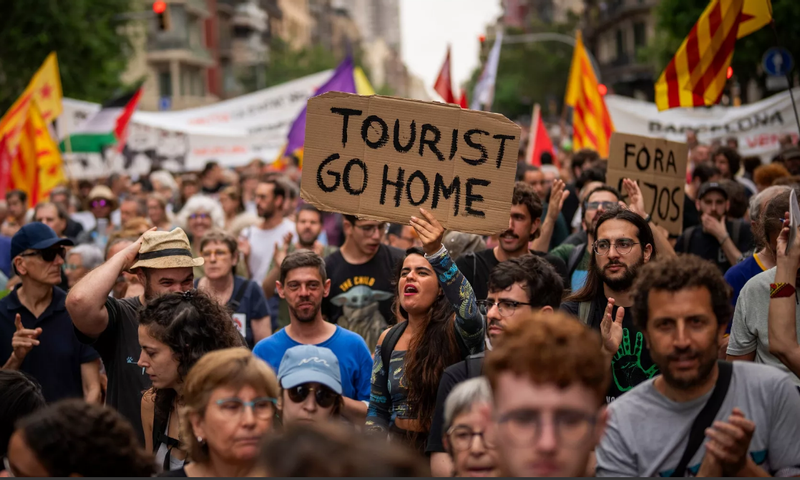European protests against cruise ships

The protesters: ΄We do not directly blame the tourists. We want to pressure our government to change policies."
While in Spain, Italy, and the Netherlands, massive protests against overtourism are taking place, in Santorini, residents are being warned with 112-type messages to limit their movements due to cruise ships…
Spain, which according to Eurostat data is – along with Italy – the EU country with the most tourism, has reached its limits, with residents taking to the streets, protesting, and 'attacking' tourists with water pistols.
In the Balearic Islands, the situation is also tense. Young Sara, who participated in the protests in Mallorca, tells Euronews: "They are erasing our identity, they are driving us away because they have bought everything! They say Mallorca lives from tourism? No, tourism lives off us, it's killing us!"
'Your luxury, our misery,' reads one banner.
'It's not tourist-phobia, it's the numbers: 1,232,014 residents, 18 million tourists.'
According to CNN and University of Queensland sustainable tourism expert, Antje Martins, the locals' protests against tourism are not so much a clash between locals and tourists, but rather "a reflection of the fact that they are not happy because they do not benefit at all from the tourism they see. The main issues here are structural, not personal."
Many of the protesters agree: "We do not directly blame the tourists. We want to pressure our government to change policies."
Contribution to the discussion on cruises
In the context of the overall European "anti-tourism" unrest, the issue of cruise ships presents particular interest and room for constructive and civilised discussion and dialogue. What do the statistics actually say about the number of cruise ship passengers?
In 2023, according to Statista, 3.6 million tourists arrived in Barcelona by cruise ship. In Corfu in 2023, the number of tourists arriving by cruise ship was 667,182, according to the Statistical Bulletin of INSETE. The difference in numbers seems significant, but if we take the data relative to the population of each destination, we see that in Barcelona with a population of 1.62 million, the ratio of permanent residents to tourists (from cruise ships) is 1 in 3, while in Corfu with approximately 100,000 residents, this ratio is about 1 permanent resident to 6 tourists. Let’s not even mention Santorini, with about 15,000 residents, which received 1,298,968 tourists exclusively from cruise ships in 2023...
In this context, it becomes understandable and obvious that the local economy benefits from the arrival of cruise ships. The question is how much it benefits compared to "traditional" tourism and whether the whole "cruise" issue is worth it if we seriously and objectively weigh the pros and cons.
Considering that within a cruise ship (let's take the Sun Princess, the largest cruise ship docking in Corfu), there are at least 17 restaurants and bars, several spaces and activities friendly for children and families, as well as entertainment spots such as theatres, casinos, sports courts, spas, and even art exhibitions, it’s not surprising that 40% of passengers do not disembark at all! This percentage emerged from a study conducted in Bergen, Norway, which also estimates that the average amount of money spent by passengers when they disembark from cruise ships is 23 euros. And it’s hard not to trust Bergen when it has been an expert in the cruise industry and a traditional port-destination since 1884!
On the other hand, the cruise industry claims that the average contribution of passengers to the local economy is much higher than what Bergen estimates, about 91 euros per day. These figures are contradicted by the annual survey of the Bank of Greece, which calculated that cruise passengers spent an average of 228.2 euros over the entire duration of their trip in 2022.
The same Greek survey shows that an individual traveller in 2022 spent 632.6 euros in our country, an amount that does not include travel tickets. No further comments are needed on the contribution of cruise passengers versus "traditional" travellers to the local economy; the numbers speak for themselves.
However, as if the small profit from cruises wasn't enough to convince some how the whole issue is not worth it, there is also the environmental impact.
As is well known, cruise ships use heavy fuel oil, a poor-quality fuel with serious effects on the local ecosystem. According to a 2020 study, a one-week cruise in the Mediterranean produces approximately 1.9 tons of CO2 equivalents per passenger, excluding flights to and from the destination. This amounts to more greenhouse gas emissions than the average Greek produces annually using a car, bus, and train. It has been estimated that a cruise ship produces almost the same amount of CO2 daily as 84,000 cars, as much nitrogen oxide as approximately 421,000 cars, particulate matter as approximately 1 million cars, and sulphur dioxide (which causes acid rain) as 376 million cars!
The main pollutants produced by cruise ships include: sulphur oxide, nitrogen oxide, carbon, black carbon, heavy metals, and methane.
And because there has been a lot of chemistry and things are getting complicated, let's say one last thing. Most people argue that since Corfu is not just a port of call but a home port (meaning that some cruise ships dock for longer hours here as boarding and disembarkation take place), it generates more revenue because there are passengers who will stay more days on the island. This is true. However, it is not taken into account that this process also involves the disposal of tons of waste and sewage on the island, as well as the supply of fresh water to the ship (since we have plenty to spare)!
Obviously, all the above, the discussion about sustainable tourism, and specifically about cruise ships, does not aim to change opinions and facts overnight, as that is neither realistic nor feasible, nor sustainable! However, we need to be aware of the climate and arguments of the pan-European protests against overtourism so that we can prevent and not suffer the same fate as countries like Spain and Italy.
KATERINA STOGIOU












